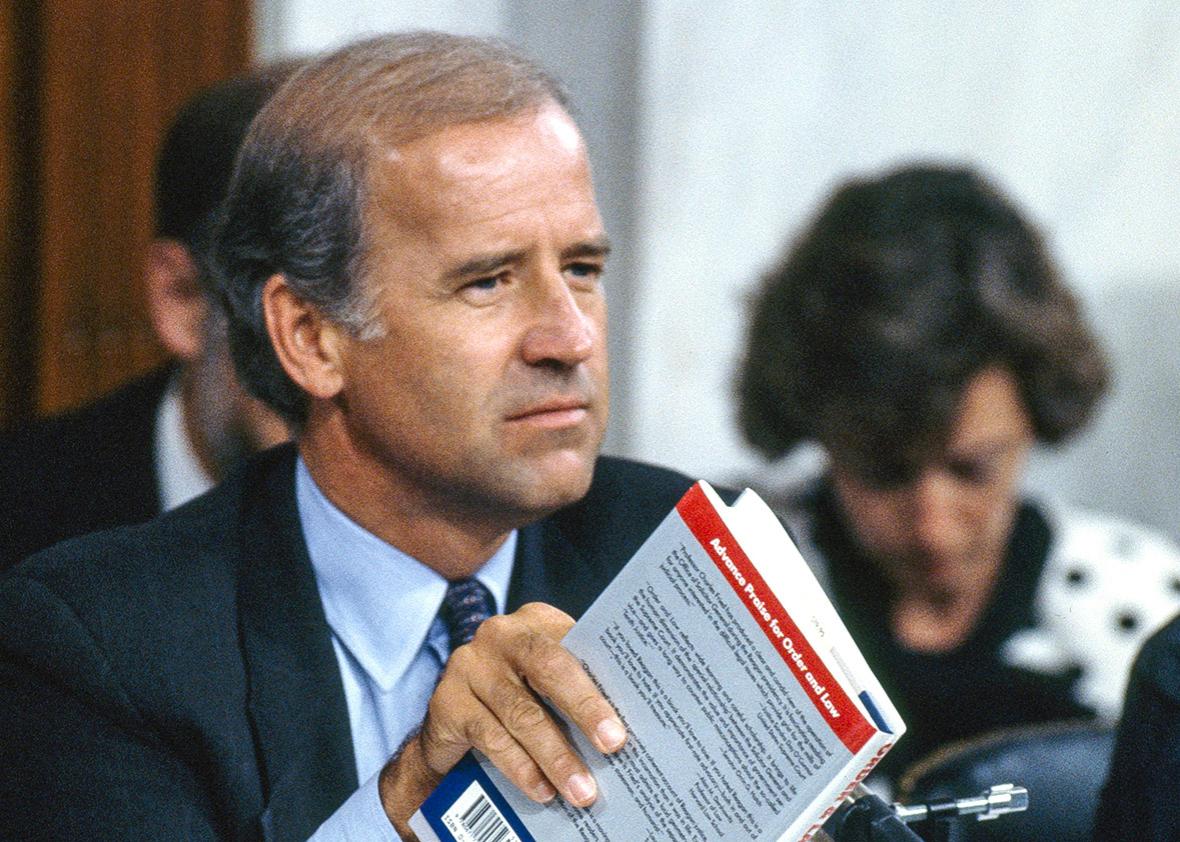It looks increasingly likely that Joe Biden is going to run for president. Why else would he, as Politico reported, personally tell Maureen Dowd, scourge of the Clintons, that his son’s dying wish was for him to enter the race? Hillary Clinton’s support has been tanking among Democratic women, her most important constituency: In a September Washington Post–ABC News Poll, only 42 percent of the female Democratic electorate backed her—1 point less, amazingly, than the number of Democratic men who support her. Maybe Biden could pick up some of these defectors. If he actually won, though, it would be a grim thing for feminism, and not just because he’s a man.
If gender issues are Hillary Clinton’s primary progressive strength, they’re one of Biden’s major weaknesses. It’s not just the role he played in Clarence Thomas’ confirmation hearings, when, as chairman of the Senate Judiciary Committee, his treatment of Anita Hill enraged feminists. Biden let her be grilled mercilessly while assuring Thomas that he had the “benefit of the doubt,” and even refused to let three witnesses who might have corroborated her story testify. That was almost 25 years ago, of course, and since then Biden has done several things to redeem himself, including championing the Violence Against Women Act. His decidedly lukewarm record on reproductive rights, however, is harder to dismiss as ancient history, particularly given the onslaught of anti-abortion legislation we’re seeing all over the country.
“There have been some clutch moments where he hasn’t been with us,” says Ilyse Hogue, president of NARAL Pro-Choice America. “I think Joe Biden is a great guy, and I think we are at a particular moment with regard to threats against abortion rights specifically, and women’s autonomy generally, that makes me a little nervous.”
It’s no secret that Biden is personally a pro-life Catholic. He takes what he believes is a “middle-of-the-road” position on abortion law, as he wrote in his 2007 campaign memoir, Promises to Keep: “I still vote against partial-birth abortion and federal funding, and I’d like to find ways to make it easier for scared young mothers to choose not to have an abortion, but I will also vote against a constitutional amendment that strips a women of her right to make her own choice.” That, at least, was an improvement from 1982, when, as a member of the Senate Judiciary Committee, he did vote for a constitutional amendment to overturn Roe v. Wade.
In 2012, the National Right to Life Committee compiled a report on Biden’s anti-abortion voting record that was intended to highlight what it called Obama’s “extreme pro-abortion positions.” The documentation in the dossier is solid. There is a scan, for example, of a 1994 letter that Biden sent to a Delaware constituent who was concerned that abortion funding would be included in health care reform. “I will continue to abide by the same principle that has guided me throughout my 21 years in the Senate: those of us who are opposed to abortion should not be compelled to pay for them. As you may know, I have consistently – on no fewer than 50 occasions – voted against federal funding of abortions.”
Now, Biden is a practical person, and knows very well that he’s seeking to lead a party that is overwhelmingly committed to abortion rights. Should he run for president, he will undoubtedly promise to protect those rights, and won’t make new abortion restrictions part of his agenda. As he recently told the Catholic publication America, he accepts church doctrine on abortion, but is not prepared to impose that doctrine on people of other faiths. Still, there’s no reason to think that thwarting Republican momentum on banning abortion would be one of his priorities. Given how often Biden has often touted his votes against late-term abortion, what would he do if, as president, the 20-week abortion ban that the House passed earlier this year came across his desk? How would he react to GOP attempts to shut down the government over federal funding of Planned Parenthood?
“Right now, in this moment in time, I need to know that I have a shared set of values with the leader of this country,” NARAL’s Hogue says. “I can’t in full confidence say yes, he does share that value of trusting women and trusting families to make their own choices.” If Biden were to get the nomination, it would mark a big change from 2012, when the Democratic Party made support for reproductive rights central to its electoral appeal. Despite Clinton’s sliding poll numbers, a lot of feminists will be disappointed if the Democrats don’t take a step forward toward gender equality by nominating a woman. It would be particularly bitter, though, if they take a step back.
Read more of Slate’s coverage of the 2016 campaign.
